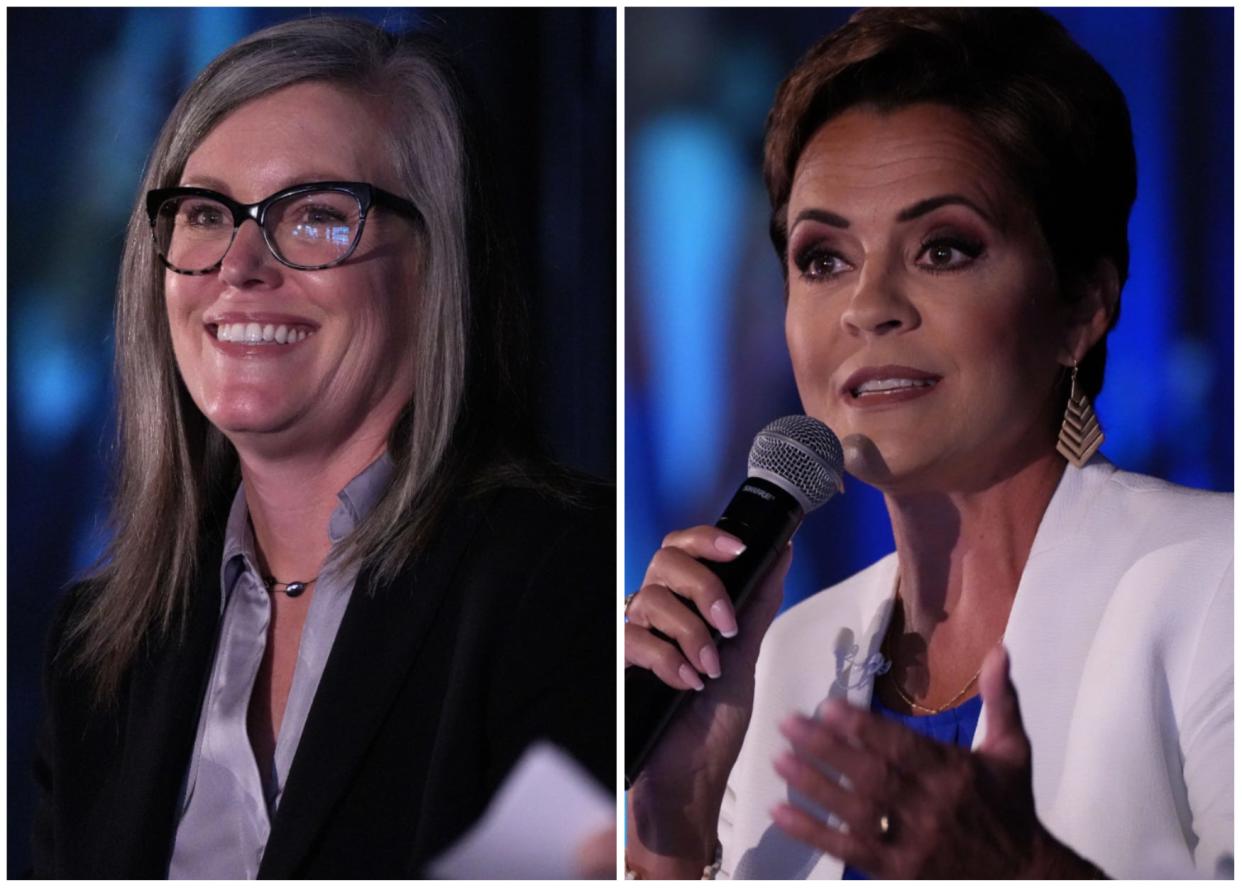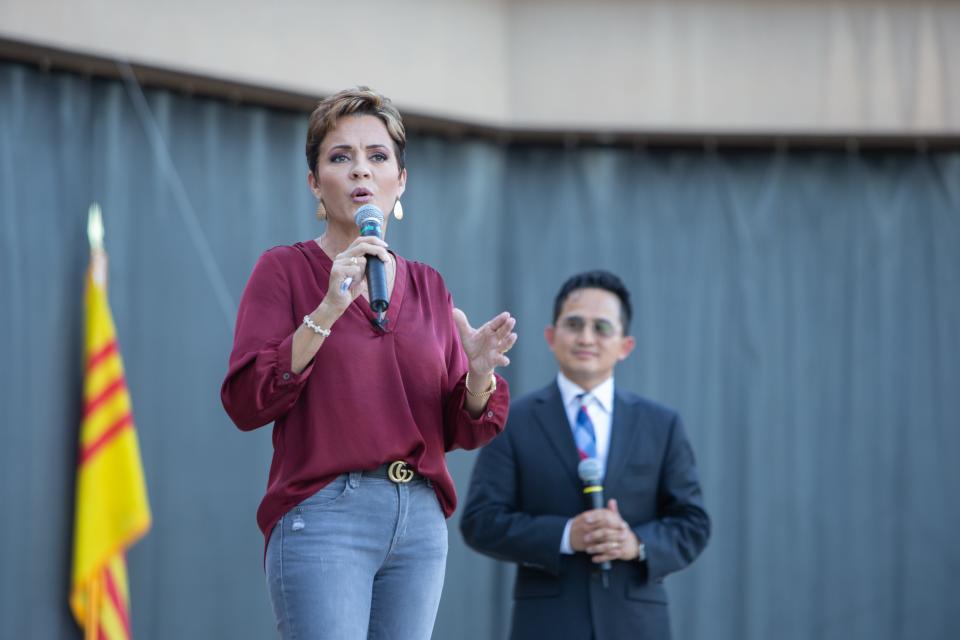Kari Lake or Katie Hobbs? Arizona's governor race is part of a radical political shift

Katie Hobbs is a child of the working class who grew up in Tempe.
Kari Lake is a child of the middle class who grew up in Iowa.
Both are children of a country that wanes and reels after the post-World War II prosperity that defined the American Century.
They went to college and built careers outside of politics: Hobbs as a social worker and Lake as a broadcast journalist.
Today they find themselves in second careers, representing the two major parties in the race for Arizona governor and swimming the shifting currents of our national politics.
There are larger issues driving this race
In the way that television and, now more directly, the internet have connected every small hamlet, medium suburb and major city in America, they have also nationalized state politics to a point that today’s race for Arizona governor very much reflects the turns in U.S. politics.
And like our national politics, we can sense the tectonic shifts of historic change.
Arizona governor's race: Poll shows tight contest between Hobbs, Lake
A wave of populism has broken over the traditional Republican Party, carrying away party mandarins and bringing in new Republicans such as Kari Lake, fully committed to shaking the table.
A cultural revolution also is changing the Democratic Party with its consuming themes of social justice and identity politics, bewildering old-school Democrats such as Katie Hobbs, who were too slow to understand the change and are only now catching up.
These new politics dominate this race because Lake went to extremes to win Trump’s blessing. To win that endorsement meant embracing Trump’s fantasy that the 2020 presidential election was stolen.
Kari Lake gulped the election fraud Kool-Aid

When the Republican Legislature approved its foolhardy “audit” of the 2020 Maricopa County ballots, Kari Lake didn’t just drink the Kool-Aid, she gulped it down.
Republican officials from the governor to the speaker of the House to the Maricopa County supervisors all affirmed the legitimacy of the election – that Joe Biden had won. But none of that mattered to Lake. She was swimming in an alternate sea of untruth.
Kari Lake’s attacks on the electoral process are not just another issue in this general election campaign. They are all encompassing. This is a platform with no precedent in Arizona electoral history. A major party candidate is running for office while undermining the legitimacy of the democratic process.
Days before the Arizona Republican primary she said, “We’re already detecting some stealing going on. If we don’t win, there’s some cheating going on. And we already know that.”
Understand that she was delegitimizing an election she ultimately won. What would she have done had she lost?
We have a model for that: Donald Trump. He gave us the Capitol riot of Jan. 6, 2021.
Hobbs made her name defending the 2020 election
Trump’s attacks on the electoral system are paramount in this race, too, because they created the Democratic nominee.
Katie Hobbs made her name in the aftermath of the 2020 race, going on cable news networks to defend the integrity of the Arizona election.
As MAGA protesters gathered outside the Arizona Capitol and even around her home, she said, “Their continued intimidation tactics will not prevent me from performing the duties I swore an oath to do. Our democracy is tested constantly, it continues to prevail, and it will not falter under my watch.”
Known for little else, Hobbs would strain to compete without this dynamic.
But she hurt herself in refusing to debate
But if Trump and Lake have handed her a gift with their election denial, Hobbs has hurt herself with her own departure from a democratic norm.
In Arizona for decades we have been choosing our governor after candidates face off in debate that is televised and livestreamed across the state.
Katie Hobbs broke with tradition and retreated from the debate, blaming Kari Lake for her decision.
If that’s the case, what explains Hobbs’ refusal to debate her Democratic primary opponent Marco López?
Not debating at all was a bad move.
Hobbs was slow to react in a cultural revolution
Like the Republican Party, the Democrats are weathering enormous change. This accelerated after the 2020 killing of George Floyd by a Minneapolis police officer.
Soon Hobbs found herself walking into the cultural headwinds.
When a second jury found the state Senate had wrongly fired a Black staff member back in 2015, the finger of accusation pointed at Hobbs, who had been the Senate minority leader at the time.
She needed to apologize quickly and sincerely, but stumbled badly. Black and Latino leaders, many of them stalwarts of the state Democratic Party, were miffed. To this day, some remain lukewarm, if not hostile, to her candidacy.
Hobbs could ride the wave of abortion rulings

Stung by the social upheaval of 2020, Hobbs would benefit from the social upheaval of 2022 spurred by a conservative U.S. Supreme Court that overturned Roe v. Wade and put reproductive rights on the front burner.
Hobbs, who is pro-abortion rights, was quick to put the issue center stage as she decried efforts to reestablish a territorial-era law that would prohibit virtually all abortions in Arizona.
A new Suffolk University/Arizona Republic poll shows that abortion is a significant motivator of women voters in Arizona. Some 72% of Democratic women ranked the issue as highest priority in their voting. Forty-nine percent of independent women and 37% of Republican women said the same.
A sign of how much abortion resonates came last week when the Republican candidate for Maricopa County attorney, Rachel Mitchell, announced she would not prosecute women for having abortions.
As Roe’s influence grows clearer, Hobbs has accused Lake of softening her own stance.
Before the court decision to vacate Roe, Lake told KTAR’s Mike Broomhead Show in May, “I believe that abortion is the ultimate sin. That’s my personal belief.”
In the aftermath of the court decision, she said:
“I’m running for governor, not for God. So I don’t get to write the laws … and I think you know that, but I will uphold the laws that are on the books.”
Lake gloms onto national border security
While Hobbs has harnessed the national issue of abortion, Kari Lake has hitched up the national issue of border security.
In a year in which Democrats control the White House and are responsible for managing immigration, the U.S.-Mexico border appears in chaos. U.S. authorities have made more than 2 million migrant arrests in the past 11 months, reports the Texas Tribune. These are numbers not seen before.
Fentanyl seizures on the southern border also hit a record high in August, reports U.S. Customs and Border Patrol.
“I will act boldly and aggressively to bring an end to our border crisis starting on day one,” said Lake. “And I will see this mission through to the final minute of the final hour of my tenure as governor of our great state.”
Lake proposes to draft an interstate compact to secure the border, use what she interprets as U.S. constitutional authority to declare the states are under “invasion” and then declare the right to defend Arizona's border.
She would, among other things, “finish Trump’s wall,” expand the Arizona Rangers to make their first priority border security, and enhance the border presence of the National Guard.
For her part, Hobbs has said she would work to “pass comprehensive immigration reform” on the federal level and to give “Dreamers” “a path to citizenship.” She would also push to improve our ports of entry.
Closer to home she would direct Department of Public Safety assistance “to sheriffs on the border," to make sure “they have the necessary intelligence and resources to handle migrant crossings humanely and efficiently.”
She would also target funds to overwhelmed “community centers and hospitals in Yuma, Nogales, Douglas, and Pima County.”
Both reflect the party line on schools
On public education, Lake and Hobbs reflect the competing philosophies of their parties.
Lake is a champion of education choice who plans to institute backpack funding, so that dollars follow children, not schools. She wants to build upon the charter school and voucher experiments to create “choice without barriers.”
She would create a statewide system of technical academies so that rural kids could learn the trades, and would replace state-mandated testing with the National Assessment of Education Progress, “the gold standard of internationally benchmarked tests,” she said.
She would also make sure schools teach accurate history and strengthen bans on critical race theory, she said.
Lake argues that too much education funding is boosting administration staffing. She would work to put more of that money into teachers’ salaries, she said.
Hobbs would focus more on traditional public schools, beginning by bringing teacher pay in line with the national average, a per annum boost of roughly $14,000 per average teacher. She would also work to get them access to affordable health care coverage.
She would “set Arizona on a course to phase in universal preschool” and pursue “universal access to full-day kindergarten, especially for students from underserved communities and English-language learners.”
To address the teacher shortage, she would expand the Arizona Teachers Academy, and would also work to address the shortage in school counselors and social workers.
To meet the demands of the new economy, she would work to get funding for grants and scholarships dedicated to training more STEM educators.
How they'd solve the problem of water scarcity
Arizona will need to move quickly to secure its water future. Hobbs would put a priority on conservation and better ways to manage our water supply.
She would establish a Water and Energy Innovation Initiative to secure our water future and promote a clean energy economy.
“Without reliable access to water, our economy and Arizona jobs will be put at risk,” she said.
Kari Lake argues that we need to find new sources of water. She would increase our storage capacity on the Salt and Verde River system by expanding dams and reservoirs, as well as “capturing storm runoffs, (and) lining and covering our canals.”
Lake would work with various tribal nations to “support responsible transfer of water rights” and “expand effluent capture and purification.”
And she would explore augmentation projects, such as desalination and pipelining fresh water from both the Missouri and Mississippi river basins, even if getting water from the Mississippi and Missouri is a “pipe dream” widely debunked by just about everyone who doesn’t live in Arizona.
What's ultimately at stake in this race
Oddly enough, neither candidate has spent much effort on a national issue that voters say is of top importance in Arizona: inflation.
Neither Hobbs nor Lake have spent much time detailing their plans to bolster the economy – a departure from the last eight years, when Republican CEO-turned-governor Doug Ducey made it a centerpiece.
But it’s clear that the state could go in opposite directions, depending on which candidate voters choose to replace him.
If Lake wins, she’d put wind in the sails of what is expected to become a more conservative Legislature – one that is expected to focus heavily in the next session on new voting restrictions and state border security posturing.
If Hobbs wins, her bully pulpit might be limited, but she would have the power of the veto. Hobbs could be the backstop to some of the Legislature’s most egregious bills.
Either way, the shift could be historic. Tectonic. And nationally significant.
This is an opinion of The Arizona Republic's editorial board.
This article originally appeared on Arizona Republic: Kari Lake or Katie Hobbs? Arizona's governor race has national meaning


